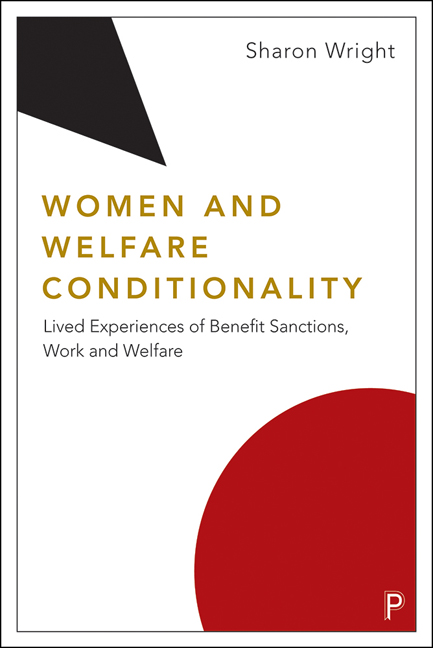Book contents
- Frontmatter
- Contents
- List of figure, tables and charts
- List of abbreviations
- Acknowledgements
- one What does work-based welfare reform mean for women?
- two Re-theorising conditional welfare as gendered lived experience and street-level practice
- three Policy context: the hidden gendered impacts of conditional welfare reforms
- four Rewriting retirement as ‘work experience’: older women’s gendered encounters with the work ethic
- five Crushing conditionality: women living through heavily enforced work-related conditionality
- six In the shadow of sanctions: disciplining women and children for violating male-defined work norms
- seven Conclusions
- Appendix 1 The Welfare Conditionality study
- Appendix 2 Sanctions overviews
- Notes
- References
- Index
six - In the shadow of sanctions: disciplining women and children for violating male-defined work norms
Published online by Cambridge University Press: 27 March 2024
- Frontmatter
- Contents
- List of figure, tables and charts
- List of abbreviations
- Acknowledgements
- one What does work-based welfare reform mean for women?
- two Re-theorising conditional welfare as gendered lived experience and street-level practice
- three Policy context: the hidden gendered impacts of conditional welfare reforms
- four Rewriting retirement as ‘work experience’: older women’s gendered encounters with the work ethic
- five Crushing conditionality: women living through heavily enforced work-related conditionality
- six In the shadow of sanctions: disciplining women and children for violating male-defined work norms
- seven Conclusions
- Appendix 1 The Welfare Conditionality study
- Appendix 2 Sanctions overviews
- Notes
- References
- Index
Summary
‘My little girl, she got bit by a dog and she got 56 stitches in her face. … I’d phoned the Jobcentre because I was due to sign on and I told them what happened and they told me I’d still have to look for work.’ (Angela)
It’s 2014 and blowing a hoolie. I rush into an echoey old church. It’s cold but the single mums are friendly. A steel urn puffs steam up to the ornate rafters. I relent and accept a smiley face biscuit. Angela is taut as she rattles out her story. She doesn’t mind looking for jobs – it’s what she’s doing anyway. It’s the near miss with a sanction she’s angry about. The injustice burns. It was six months ago but still fresh in her mind.
On the day, Angela phoned and told her work coach that she couldn’t come in because she had to stay at home with her 11-year-old daughter who was recovering from a bull-terrier attack outside their door the night before. Angela wasn’t sanctioned but she felt scarred by it. She needed flexibility and empathy from her work coach. What she actually got was a stern warning that if something like that happened again her benefits would get cut.
Angela is 34. She’s a lone parent with three kids, 6, 11 and 13. Her narrow escape from sanctions is intensely emotive. The bottom line for women in her position is that “you can’t always [work] as a mother, you’ve got to make sure your little one’s fine”.
Angela used to work at a call centre but finds it difficult to balance a job with looking after her kids. The second time we speak to her, Angela is working part-time for a call centre but on a self-employed basis. A year later, she has moved off Jobseeker’s Allowance onto Employment and Support Allowance Support Group because the stress worsened her asthma and depression. She now volunteers as ‘permitted work’ in a charity shop two days per week.
Introduction
Angela’s brush with the sanctions system came at a traumatic time and had long-lasting negative impacts. Many women in the study feared or experienced sanctions during very difficult times in their lives.
- Type
- Chapter
- Information
- Women and Welfare ConditionalityLived Experiences of Benefit Sanctions, Work and Welfare, pp. 101 - 116Publisher: Bristol University PressPrint publication year: 2023



